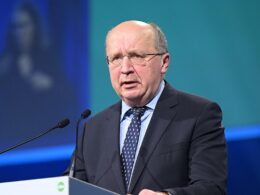After weeks of negotiations, the 27 members of the European Union have reached an agreement to provide €50 billion in financial assistance to Ukraine from 2024 to 2027, according to an announcement made on Thursday by EU Council President Charles Michel.
The aid unlocks much-needed support to keep Ukraine's essential services afloat as the country spends nearly all revenues on defense, and provides much-needed reassurance as an aid package for Ukraine remains blocked in US Congress.
"This locks in steadfast, long-term, predictable funding for Ukraine. EU is taking leadership & responsibility in support for Ukraine; we know what is at stake," Michel tweeted.
We have a deal. #Unity
All 27 leaders agreed on an additional €50 billion support package for Ukraine within the EU budget.
This locks in steadfast, long-term, predictable funding for #Ukraine.
EU is taking leadership & responsibility in support for Ukraine; we know what is…
— Charles Michel (@CharlesMichel) February 1, 2024
The breakthrough came after a meeting between Hungarian Prime Minister Viktor Orban, German Chancellor Olaf Scholz, and other EU leaders, Spiegel reported. Hungary had previously blocked an agreement on aid for Ukraine, but has now dropped its opposition.
Final countdown to the #EUCO summit.
Consultations ongoing. pic.twitter.com/WcXLjhxViN
— Charles Michel (@CharlesMichel) February 1, 2024
"The EU is providing vital assistance that will help sustain Ukraine through Russia's unprovoked and unjustified invasion," Michel said, Spiegel reported.
The aid package aims to cover a significant portion of Ukraine's estimated €3-4 billion monthly financing needs in 2023. According to EU officials, the funds will help pay salaries and pensions, as well as maintain essential services and infrastructure.
"This aid package demonstrates the EU's steadfast commitment to stand with Ukraine," said European Commission President Ursula von der Leyen. "We will continue supporting Ukraine for as long as it takes."
President Zelenskyy welcomed the decision.
"It is very important that the decision was made by all 27 leaders, which once again proves strong EU unity. Continued EU financial support for Ukraine will strengthen long-term economic and financial stability, which is no less important than military assistance and sanctions pressure on Russia," the Ukrainian president posted on X (Twitter).
Grateful to @CharlesMichel and EU leaders for establishing the €50 billion Ukraine Facility for 2024-2027.
It is very important that the decision was made by all 27 leaders, which once again proves strong EU unity.
Continued EU financial support for Ukraine will strengthen…
— Volodymyr Zelenskyy / Володимир Зеленський (@ZelenskyyUa) February 1, 2024
It was also welcomed by EU leaders, with Latvian Prime Minister Evika Siliņa saying the package will strengthen Ukraine in its fight for freedom. Petteri Opro, the Finnish prime minister, said: “It is important that we move forward and that the support for Ukraine continues to be strong as planned.”
https://twitter.com/EvikaSilina/status/1753003168084930656?ref_src=twsrc%5Etfw%7Ctwcamp%5Etweetembed%7Ctwterm%5E1753003168084930656%7Ctwgr%5E6a33ae56d6c4e82bad4be8a388e03f45c969e185%7Ctwcon%5Es1_&ref_url=https%3A%2F%2Fwww.theguardian.com%2Fworld%2Flive%2F2024%2Ffeb%2F01%2Feu-leaders-gather-for-key-summit-in-bid-to-unblock-orban-veto-on-ukraine-aid-europe-live%3Fpage%3Dwith3Ablock-65bb75928f08898ace918b48
The agreement came after accusations that Orban was "blackmailing" the EU by demanding the release of billions in funding frozen over rule-of-law violations. The Hungarian prime minister has maintained close ties with Russian President Vladimir Putin.
Minor compromises with Orban
Diplomats questioned by Politico said that the European leaders managed to win over Orbán with three additions:
- There will be an annual report by the European Commission on the implementation of the aid package
- There will be a debate at leaders level on the implementation of the package and if it is needed, in two years the European Council will ask the Commission propose a review of the new budget, according to the latest version of the draft European Council conclusions.
- EU leaders added a line referring to earlier conclusions from December 2020 to guarantee that the way rule of law in Hungary is evaluated by the European Commission is done in fair and objective manner.
The text of the agreement was seen by The Guardian:

The concessions are seen in Brussels as minor, as leaders have avoided a scenario in which Orbán would have the possibility of a yearly veto of the financial lifeline for Ukraine. But this way, Orbán can proclaim victory at home saying Hungary obtained a review, Politico reported.
No other concessions were given to Orbán, and increased pressure from leaders made clear to Budapest that there was no alternative than giving in on the money to Ukraine, Politico wrote.
"A key element was rebuilding trust between Hungary and the European Commission, for which the extra line on the conditionality mechanism was key," it noted, citing diplomats.
The Hungarian veto scenario Politico refers to was earlier reported by Reuters. According to it, EU leaders proposed including language in the summit decision calling for annual reviews of the planned €50 billion aid package for Ukraine in order to secure Hungary's support for approving the funds.
This was tentative acceptance of Hungarian Prime Minister Viktor Orban's proposal of a compromise agreement -- that funding for Ukraine would be allocated on the condition that "each year we will decide whether we will continue sending this money or not." This would effectively have given Hungary the ability to block the aid annually.
Hungary's history of blocking EU decisions on Ukraine
Aid was originally set to be approved at an EU summit in December, but Hungary vetoed the deal until a compromise could be reached.
At that summit, Hungary also threatened the vote to start negotiations with Ukraine over EU membership. However, creative "coffee diplomacy" by German Chancellor Olaf Scholz, during which Scholz left the room during the vote, which requires unanimity, managed to pass the decision.
Another contentious point was Hungary's blockage of a €500 million tranche from the European Peace Facility intended to support Ukraine militarily. This blockage was initially due to Ukraine’s inclusion of Hungary's OTP Bank on a list of international sponsors of the war, a decision that Hungary contested. Despite Ukraine removing OTP Bank from this list, Hungary sought legal assurances regarding this removal, contributing to ongoing negotiations and discussions within the EU on how to proceed with the aid package.
The European Union has been exploring alternatives to bypass potential vetoes from Hungary, including the possibility of arranging separate state agreements with Ukraine to secure the necessary funding. This "workaround" approach suggests that individual EU countries could enter into their own assistance agreements with Kyiv, which, collectively, could amount to the proposed aid package. Such measures underscore the EU's commitment to supporting Ukraine while navigating the complexities of consensus-based decision-making within the bloc.
- On 29 January, it was reported that the European Union threatened to isolate and hurt Hungary's economy if Hungarian Prime Minister Viktor Orbán blocked €50 billion in aid to Ukraine. This threat was made in response to Hungary's potential obstruction of the aid package, which could have severe economic consequences for the country.
- Seven days earlier, on 26 January, Finnish Foreign Minister Elina Valtonen mentioned that Hungary had given a "positive signal" that it would not block the €50 billion euros in EU aid to Ukraine, implying a possible resolution to the issue.
- After pro-Russian politician Robert Fico's victory, Slovakia emerged as another EU country obstructing decisions on Ukraine. However, on 24 January 2024, Slovakia's prime minister pledged not to join Hungary in blocking the €50 billion euro aid package for Ukraine, indicating a different stance from Hungary.
Article was updated to include details of the compromise




